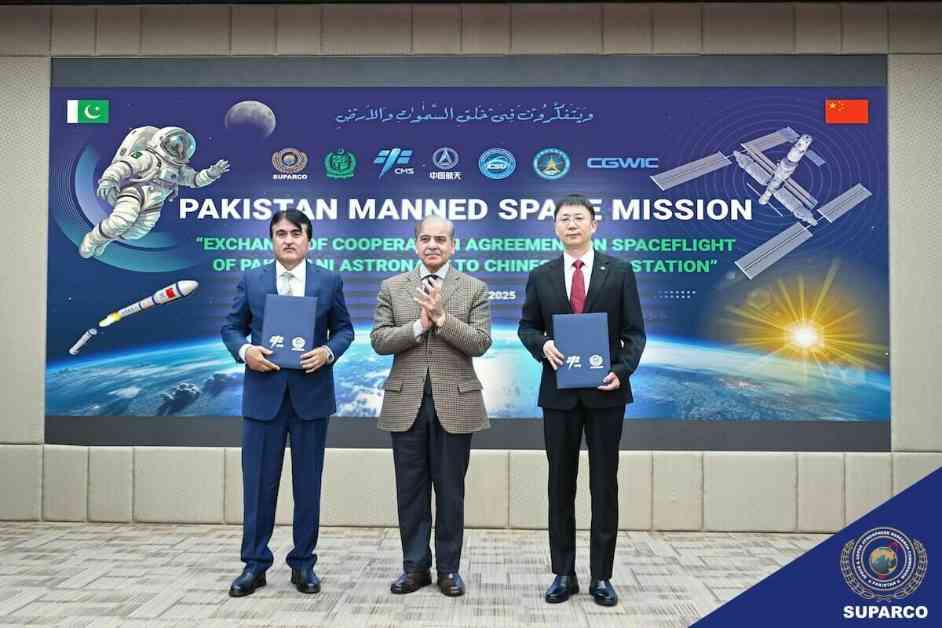Pakistan is making strides in the realm of space exploration, with plans to send its first astronaut into space through a collaboration with the China Manned Space Agency (CMSA). This groundbreaking initiative follows an agreement signed between the Space & Upper Atmosphere Research Commission (SUPARCO) and the CMSA, setting the stage for two Pakistani astronauts to undergo intensive training at the Astronaut Center of China. The ultimate goal is to select one astronaut as a scientific payload specialist for a future mission to Tiangong, China’s space station, by 2026.
In this exciting mission, the chosen Pakistani astronaut will have the opportunity to conduct a variety of experiments across multiple disciplines such as medical sciences, aerospace, physics, space radiation, ecology, and astronomy while aboard the Chinese Space Station (CSS). These experiments are designed to push the boundaries of space technology and contribute to scientific advancements that could potentially benefit life on Earth in significant ways.
The significance of this partnership was underscored by Prime Minister Shehbaz Sharif, who hailed the agreement as a pivotal moment in Pakistan’s space program. He emphasized that this collaboration represents a key aspect of the country’s aspirations in the realm of human spaceflight, building on Pakistan’s existing achievements in satellite launches and its contributions to global scientific research.
Minister for Planning & Development Ahsan Iqbal echoed this sentiment, highlighting the transformative impact of this partnership on technological innovation and human spaceflight capabilities in Pakistan. He emphasized that the collaboration with China extends beyond astronaut training, laying a solid foundation for Pakistan’s long-term ambitions in space exploration and research.
The Director General of the CMSA, Dr. Lin Xiqiang, warmly welcomed Pakistan’s participation in this venture, emphasizing the deepening cooperation between the two countries in the field of space exploration. Similarly, SUPARCO Chairman Mohammad Yousuf Khan lauded this initiative as a major milestone, encouraging professionals and researchers to actively contribute to the program and propel Pakistan’s space endeavors to new heights.
In addition to this groundbreaking collaboration, SUPARCO has also announced the official start of Ramadan in Pakistan, based on its lunar calculations, further adding to the significant developments in the country.
With this momentous agreement, Pakistan is embarking on a remarkable journey towards human spaceflight, signaling a new era in its space exploration narrative. This strategic partnership with China not only highlights Pakistan’s growing presence in the global space community but also underscores the country’s commitment to advancing scientific research and technology in the pursuit of space exploration.
The Road to Space: A Historic Collaboration
As Pakistan gears up to send its first astronaut into space, the collaboration with China stands out as a key milestone in the country’s space exploration journey. This partnership not only opens up new avenues for scientific research and technological advancements but also symbolizes the spirit of international cooperation in the realm of space exploration. The rigorous training and preparation that the Pakistani astronauts will undergo in China’s Astronaut Center are crucial steps towards realizing the dream of human spaceflight from Pakistan.
Advancing Science and Technology: The Promise of Space Research
The experiments that the Pakistani astronaut will conduct aboard the Chinese Space Station hold immense promise for advancing scientific knowledge and technological capabilities. From medical sciences to astronomy, these experiments are poised to deliver groundbreaking insights that could have far-reaching implications for both space exploration and life on Earth. By delving into these diverse fields of research, Pakistan is not only showcasing its commitment to scientific excellence but also laying the groundwork for future innovations in space technology.









